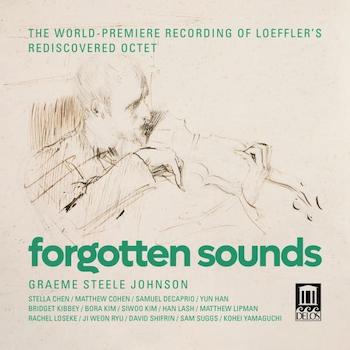Classical Album Reviews: Jordan Bak’s “Cantabile: Anthems for Viola” and Charles Martin Loeffler’s “Forgotten Sounds”
By Jonathan Blumhofer
Two discs: Jamaican-American musician Jordan Bak celebrates music for the viola and a reconstruction of Charles Martin Loeffler’s abandoned Octet.

What was it about 20th-century British composers and the viola? Rarely has an instrument found better or more consistent advocates than that one in that place over those decades.
True, Jamaican-American violist Jordan Bak’s new disc doesn’t limit itself to a single geographic area or timeframe. But two of its biggest items — and its three strongest selections — all hail from the British Isles over, roughly, the middle half of the last century.
The most noteworthy of those is Arnold Bax’s Sonata for Viola and Piano. Written in 1922, the three-movement score offers songfulness in spades: whole stretches sound like English folk song refracted through a prism. Accordingly, echoes of some of the composer’s contemporaries (Vaughan Williams, Bartók) hover.
Yet the music goes decidedly its own way, Bax’s ear for invention and development (not to mention musical structure) never being taken for a loss. His command of the viola’s capabilities, too, is invigorating and thoroughly idiomatic.
Bak and pianist Richard Uttley have a field day with the Sonata, mining the soulful colors of the outer movements and imbuing its central Allegro with just the right amount of acid. Throughout, the pair display terrific ensemble, their strong attention to the dynamic and expressive character of the music resulting in a reading that’s direct, stylish, and (come the finale’s coda) resoundingly cathartic.
They turn in an equally fresh account of Benjamin Britten’s Lachrymae. A set of variations-in-reverse on a haunting theme by John Dowland, here its arguments unfold with resonance and clarity, culminating in a touching, mournful denouement.
The pair’s take on Ralph Vaughan Williams’s Romance is aptly fervent, while they capture the spare delicacy of Augusta Read Thomas’s Song Without Words (which receives its debut recording).
For the remaining tracks, Bak has the floor to himself. Jonathan Harvey’s sometimes gritty, sometimes shimmering Chant evokes the ecstasies of religious practice. Meantime, the huge expressive range of Bright Sheng’s The Stream Flows is matched by the intensity of the violist’s performance.
 A hundred years ago, Charles Martin Loeffler was the toast of Boston. A former concertmaster of the Boston Symphony, celebrated teacher, prolific composer, friend of the Who’s-Who of the day (John Singer Sargent was one of his buddies, as was, later, George Gershwin), Loeffler cut a striking figure.
A hundred years ago, Charles Martin Loeffler was the toast of Boston. A former concertmaster of the Boston Symphony, celebrated teacher, prolific composer, friend of the Who’s-Who of the day (John Singer Sargent was one of his buddies, as was, later, George Gershwin), Loeffler cut a striking figure.
Yet, today, his music is all but forgotten and, as Graeme Steele Johnson’s absorbing liner notes point out, much of his output may already be lost. So Forgotten Sounds, which pairs two Loeffler items — the Octet and an arrangement of his song Timbres oubliés — with a new setting of Claude Debussy’s Prelude to the Afternoon of a Faun, is as much a reclamation project as it is a statement about the permeability and flukiness of the canon itself.
At the center of it is Johnson’s reconstruction of the Octet, which apparently caused quite a stir on its 1897 premiere but was never published or performed thereafter. The reasons why aren’t entirely clear, but it seems that Loeffler, who was a stickler for detail, wasn’t fully satisfied with the effort; the manuscript that made its way to the Library of Congress was in various states of revision.
So it says something of Johnson’s recomposition that the score — for the peculiar ensemble of two clarinets, harp, string quartet, and bass — involves some emphatically satisfying music. Indeed, all three of its movements (but especially the first) are amiable and flowing. The Adagio is a model of lush beauty. While the finale’s zingara evocations are a bit more restrained than, say, Brahms’s, they’re plenty zesty and characterful.
Of course, it doesn’t hurt that the Octet gets the royal treatment in the form of an ensemble consisting of clarinetists Johnson and David Shifrin, harpist Bridget Kibbey, violinists Stella Chen and Siwoo Kim, violist Matthew Lipman, cellist Samuel DeCaprio, and bassist Sam Suggs. Their performance is so warm, nuanced, and fluent that it proves impossible to resist.
The album’s filler is likewise agreeable, especially the Debussy, which thins out the original without making it sound or feel diminutive. As with the performances, Delos’s recorded sound is spacious and clear.
Jonathan Blumhofer is a composer and violist who has been active in the greater Boston area since 2004. His music has received numerous awards and been performed by various ensembles, including the American Composers Orchestra, Kiev Philharmonic, Camerata Chicago, Xanthos Ensemble, and Juventas New Music Group. Since receiving his doctorate from Boston University in 2010, Jon has taught at Clark University, Worcester Polytechnic Institute, and online for the University of Phoenix, in addition to writing music criticism for the Worcester Telegram & Gazette.
Tagged: "Cantabile Anthems", "Cantabile: Anthems for Viola", "Forgotten Sounds", Charles Martin Loeffler, Delos, Delphian
